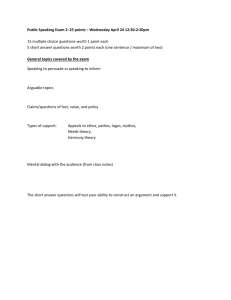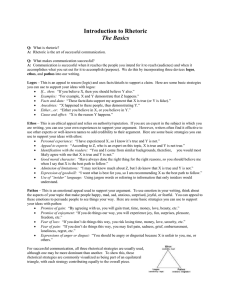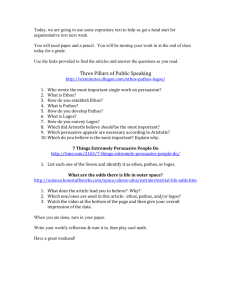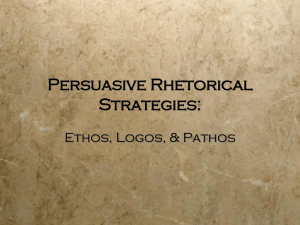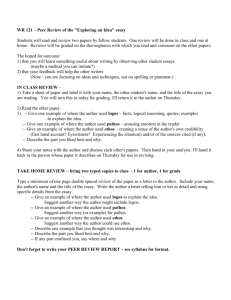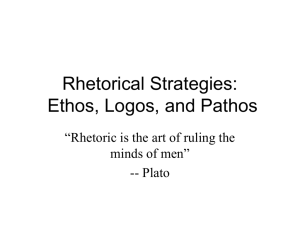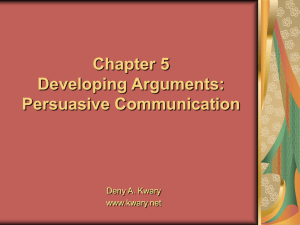Ethos, Pathos and Logos
advertisement
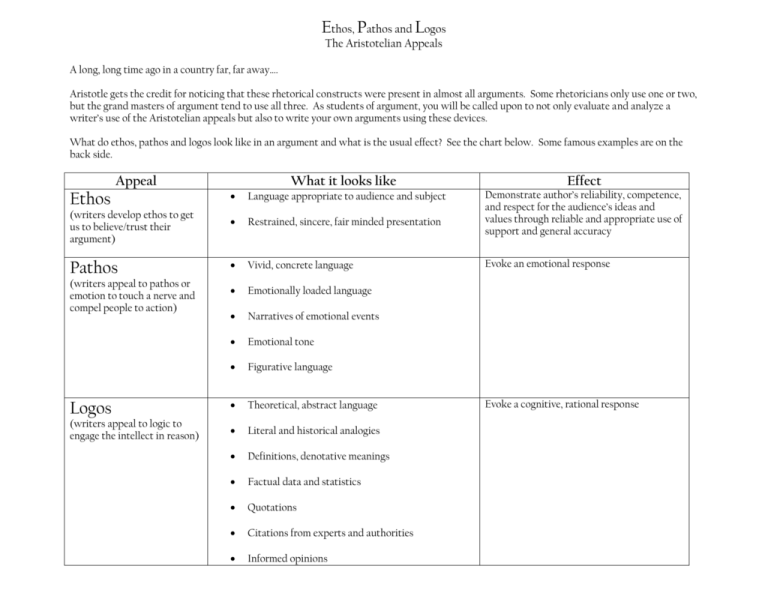
Ethos, Pathos and Logos The Aristotelian Appeals A long, long time ago in a country far, far away…. Aristotle gets the credit for noticing that these rhetorical constructs were present in almost all arguments. Some rhetoricians only use one or two, but the grand masters of argument tend to use all three. As students of argument, you will be called upon to not only evaluate and analyze a writer’s use of the Aristotelian appeals but also to write your own arguments using these devices. What do ethos, pathos and logos look like in an argument and what is the usual effect? See the chart below. Some famous examples are on the back side. Appeal Ethos (writers develop ethos to get us to believe/trust their argument) Pathos (writers appeal to pathos or emotion to touch a nerve and compel people to action) Logos (writers appeal to logic to engage the intellect in reason) What it looks like Language appropriate to audience and subject Restrained, sincere, fair minded presentation Vivid, concrete language Emotionally loaded language Narratives of emotional events Emotional tone Figurative language Theoretical, abstract language Literal and historical analogies Definitions, denotative meanings Factual data and statistics Quotations Citations from experts and authorities Informed opinions Effect Demonstrate author’s reliability, competence, and respect for the audience’s ideas and values through reliable and appropriate use of support and general accuracy Evoke an emotional response Evoke a cognitive, rational response Ethos When in the course of human events it becomes necessary for one people to dissolve the political bands which have connected them with another and to assume among the powers of the earth, the separate and equal station to which the Laws of Nature and of Nature's God entitle them, a decent respect to the opinions of mankind requires that they should declare the causes which impel them to the separation. “Declaration of Independence”—July 4, 1776 Pathos "I am not unmindful that some of you have come here out of great trials and tribulations. Some of you have come fresh from narrow jail cells. And some of you have come from areas where your quest -- quest for freedom left you battered by the storms of persecution and staggered by the winds of police brutality. You have been the veterans of creative suffering. Continue to work with the faith that unearned suffering is redemptive. Go back to Mississippi, go back to Alabama, go back to South Carolina, go back to Georgia, go back to Louisiana, go back to the slums and ghettos of our northern cities, knowing that somehow this situation can and will be changed." I Have a Dream by Martin Luther King Jr. August 28th, 1963. Logos “We hold these truths to be self-evident, that all men are created equal, that they are endowed by their Creator with certain unalienable Rights, that among these are Life, Liberty and the pursuit of Happiness. That to secure these rights, Governments are instituted among Men, deriving their just powers from the consent of the governed. That whenever any Form of Government becomes destructive of these ends, it is the Right of the People to alter or to abolish it, and to institute new Government, laying its foundation on such principles and organizing its powers in such form, as to them shall seem most likely to effect their Safety and Happiness. Prudence, indeed, will dictate that Governments long established should not be changed for light and transient causes; and accordingly all experience hath shewn that mankind are more disposed to suffer, while evils are sufferable than to right themselves by abolishing the forms to which they are accustomed. But when a long train of abuses and usurpations, pursuing invariably the same Object evinces a design to reduce them under absolute Despotism, it is their right, it is their duty, to throw off such Government, and to provide new Guards for their future security. Such has been the patient sufferance of these Colonies; and such is now the necessity which constrains them to alter their former Systems of Government. The history of the present King of Great Britain is a history of repeated injuries and usurpations, all having in direct object the establishment of an absolute Tyranny over these States. To prove this, let Facts be submitted to a candid world.” “Declaration of Independence”—July 4, 1776

